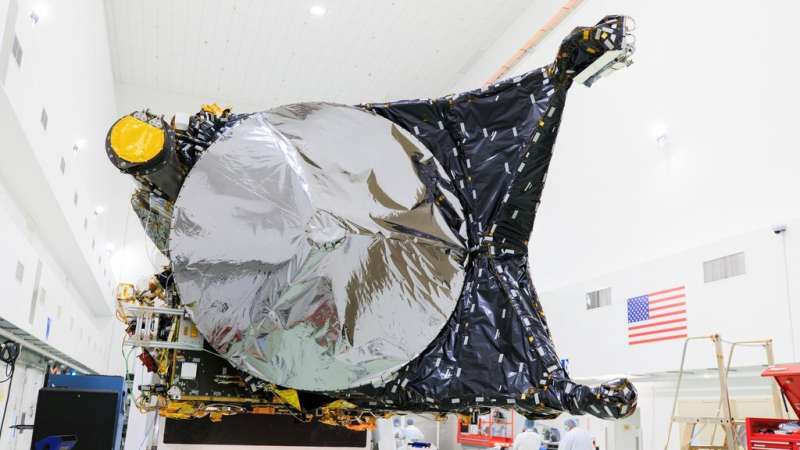Engineers and technicians at Cape Canaveral are preparing the Psyche spacecraft for liftoff, which is slated for Oct. 5.
With less than 100 days to go before its Oct. 5 launch, NASA’s Psyche spacecraft is undergoing final preparations at Cape Canaveral, Florida. Teams of engineers and technicians are working almost around the clock to ensure the orbiter is ready to journey 2.5 billion miles (4 billion kilometers) to a metal-rich asteroid that may tell us more about planetary cores and how planets form.
The mission team recently completed a comprehensive test campaign of the flight software and installed it on the spacecraft, clearing the hurdle that kept Psyche from making its original 2022 launch date.

“The team and I are now counting down the days to launch,” said Henry Stone, Psyche’s project manager at NASA’s Jet Propulsion Laboratory in Southern California. “Our focus has shifted to safely completing the final mechanical closeout of the spacecraft and preparing the team for operations. The team is conducting numerous training activities to ensure that we are prepared and ready. It’s a very busy time, but everyone is very excited and looking forward to the launch.”
Psyche is set to launch atop a SpaceX Falcon Heavy (the first interplanetary launch for that rocket) from Space Launch Complex 39A at Kennedy Space Center at 10:38 a.m. EDT (7:38 a.m. PDT) on Oct. 5, with additional opportunities scheduled through Oct. 25. After escaping Earth’s gravity, the Psyche spacecraft will use solar electric propulsion to accomplish its six-year journey to asteroid Psyche.
Measuring about 173 miles (279 kilometers) at its widest point, the asteroid Psyche presents a unique opportunity to explore a metal-rich body that may be part of a core of a planetesimal, the building block of an early planet. Once the spacecraft reaches Psyche in the main asteroid belt between Mars and Jupiter, it will spend at least 26 months orbiting the asteroid, gathering images and other data that will tell scientists more about its history and what it is made of.
Next steps
But first, a team of 30 or so engineers and technicians will wrap up the assembly, test, and launch operations phase of the mission. The team recently finished several weeks of functional testing of the science instruments as well as the spacecraft hardware and software.
After removing the last of the cables that snake around the hardware for testing, they’ll “close out” the spacecraft by reinstalling some exterior panels that had been removed for access and complete the thermal blanketing. Later in July, they will integrate and test the deployment of the enormous solar arrays. Then, in mid-August, a crew will begin slowly loading all 2,392 pounds (1,085 kilograms) of propellant—the neutral gas xenon—onto the spacecraft over the course of a couple weeks.
Luis Dominguez, the systems and electrical lead for assembly, test, and launch operations, is usually based at JPL but has been working full time at the Cape since early June. “We are moving forward,” he said, “and we’re confident that when we’re on the pad, we’ll be ready to hit the button. For all of us, we’ll be excited to launch this bird.”
Citation:
NASA’s Psyche mission enters home stretch before launch (2023, July 18)
retrieved 19 July 2023
from https://phys.org/news/2023-07-nasa-psyche-mission-home.html
This document is subject to copyright. Apart from any fair dealing for the purpose of private study or research, no
part may be reproduced without the written permission. The content is provided for information purposes only.

